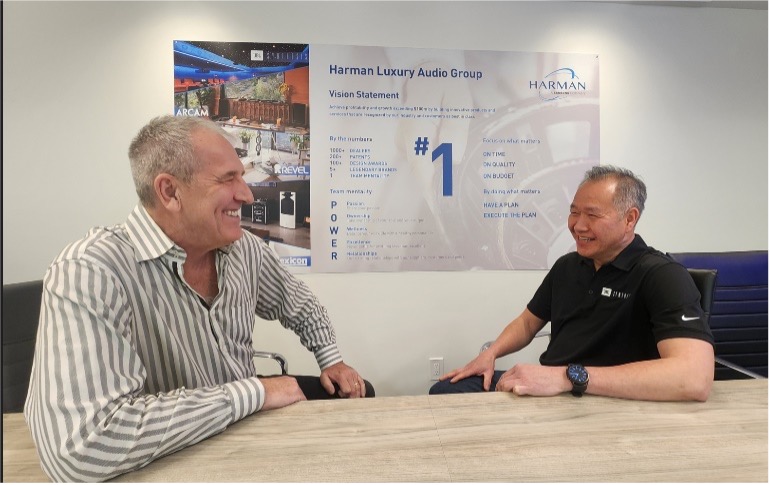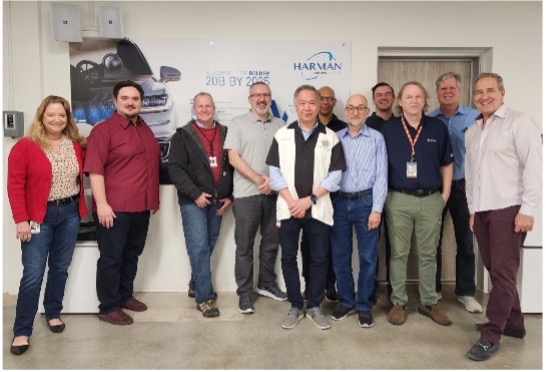What's New
Tenure and Culture Powers Results
By Dave Tovissi
Vice President and General Manager
HARMAN Luxury Audio

The First Quarter (Q1) of the year is when many companies like HARMAN engage in the prior year’s performance reviews and the current year’s target setting activities. At HARMAN, we not only review our employees’ performance against metrics and targets, but we also review them on how they represent our company’s core values. Fresh off this activity I was reminded how important tenure and culture play a part in the success of our business.
Based on the Bureau of Labor Statistics, the average tenure of today’s employees is four years. If one digs deeper into the Statistical Data, one will see that tenure is higher for older employees. For instance, for workers over the age of 60 the average tenure is 10 years. The dynamics and realities for the length at which an employee stays with a single employer have shifted dramatically over the last decade. However, metrics determining performance and achievement have generally remained the same. As a result, both employers and employees are redefining their understanding of what tenure means and the impact it can have from a career and company advancement perspective.
At HARMAN, and especially within the Luxury Audio Group, we are fortunate to have numerous employees that have over 30 years of tenure at HARMAN. As a matter of fact, we recently celebrated the 35-year work anniversary for An Nguyen, our Distinguished Acoustic Engineer, and the mastermind behind many of our patented technologies at HARMAN. Earlier this month, I sat down to speak with An about his historic milestone with the company and I asked him what keeps him engaged and loyal to the company. An shared with me that HARMAN was the first company that he ever worked for since immigrating to the U.S. in 1986. He told me that he accepted a job at HARMAN in 1988 as a repair technician working on car audio amplifiers. He wanted me to know that HARMAN made it easy for him to earn his degree while he was working. He said management has always been willing to allow flex scheduling with our employees and encourages people to learn more.
An also told me that there are three main reasons that he has remained loyal to HARMAN for the past 35 years.

David Tovissi interviewing An Nguyen about his 35 years of service with HARMAN
• HARMAN employs and fosters Passionate People who collaborate and share with each other.
• HARMAN provides him and his team with the best resources and tools to research, develop and test new technologies.
• HARMAN is a humble and responsible company willing to share knowledge and research with everyone.
When asked if he thinks that tenured employees have advantages over newer employees, he shared that his tenure at HARMAN has allowed him to build relationships across the country and he feels that it provides him more confidence in knowing that he could call on anyone for help. He said that less tenured employees have the same advantages that he has but they don’t have the relationships built. Of course An was quick to point out that he is always willing to provide guidance and mentorship to anyone who wants to grow at HARMAN.
There is plenty of data that shows that tenured employees tend to feel more stable in their careers and positions, resulting in increased motivation, productivity and commitment to the organization. Employees with a long tenure are critical to the organization because once they reach a certain point, they become the organization. As critical stakeholders, tenured employees possess a unique insight into the policies and procedures of an organization. These employees have adapted and advocated for the culture, likely possess functional expertise in both the job and our industry, and they are the best recruiters to external candidates that value the benefits of working at HARMAN recruitment and retention.
If tenure leads to more productivity what leads to longer tenure? Over my career I have been fortunate to work for several great companies that had tenured employees. All those companies, including HARMAN, all had great corporate cultures. Company culture is about creating an environment that helps people thrive. Every company has its own unique culture, dictated by its values, beliefs and practices. A good company culture should be based on shared values that inspire employees to do their best work every day. To create such an environment, we need to focus on creating a positive atmosphere that fosters creativity and encourages collaboration among team members. A company’s culture may include things like communication methods and decision-making processes, working hours, unwritten rules around decision-making authority, and rewards and recognition systems. All these factors contribute to creating a healthy company culture that promotes productivity as well as employee wellbeing.
My sit down interview with An also included questions about our culture at HARMAN and how that has played a part in his loyalty to the company. An shared that HARMAN has a great culture and one that has always been based on inclusivity. He shared that HARMAN invests in our employees by providing training and knowledge on how to better navigate through any challenges that he or his peers may face at work. He said our culture helps foster stronger relationships, which will ultimately make employees feel more connected with their job.







Members of Luxury Audio - Northridge loudspeaker team posing with An Nguyen wearing is commemorative 35 Year Anniversary bowling shirt.

Members of Luxury Audio - Cambridge electronics team posing at the Olympic Velodrome in London after participating in a Charitable Team Building Event
The key takeaways from my interview with An reminded me how culture plays an important role in why employees are attracted to our company and why they stay longer with us. If you are wanting to retain your best people, I encourage you to take these simple steps:
• Establish Core Values: Outlining and embracing core values is essential when creating a strong company culture.
• Embrace diversity: A diverse team with different backgrounds and points of view can bring fresh ideas to the table.
• Encourage employee development: Investing in employee development shows that you value them and helps build trust.
• Foster open communication: Create an open dialog between your management and their team members.
• Show appreciation: We use Be Brilliant to let our team members know how much we appreciate their efforts and loyalty.
Creating a positive company culture doesn’t have to be complicated but it does require effort from both management and employees alike if it’s going to succeed in the long term.

